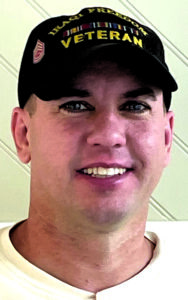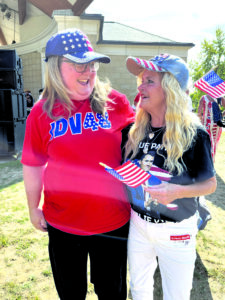Canfield Marine vet ‘under attacks daily’

Eric Parisi
CANFIELD — When Eric Parisi graduated from Canfield High School in 1999, he didn’t really have a clear direction in his life.
He did one year at Youngstown State University following a nondegree path. His uncertain path forward changed when he spoke with a local recruiter.
“I told the recruiter I wanted to see the country and the world,” Parisi said. “The recruiter replied, ‘The military can offer that.’ He was right.”
In Septem-ber 2000, Parisi enlisted in the U.S. Marines. He started at Parris Island, South Carolina, then transferred to North Carolina for combat training.
“I decided I wanted to go into the intelligence field,” he said. “I wanted to be an intelligence specialist who collected data, analyzed it and documented it for whoever needed it.”
The choice of fields saw Parisi continuing his military education in Virginia Beach, Virginia. From there, he was assigned to the 1st Marine Division at Camp Pendleton in California where he achieved the rank of corporal. In 2002, his unit was deployed to Kuwait, where he and his unit played a role in Operation Iraqi Freedom in 2003.
“Because we were a ground unit, we supported the infantry battalions,” Parisi said.
As an intelligence unit, he said the main task was to collect data about weather, terrain and the enemy. The unit had weather equipment similar to that used to forecast weather in the states.
“My job as a specialist was to put all that information together and brief or debrief people,” he said.
He said the climate in Kuwait was very dry and very hot. A storm would kick up dust and sand. It was a challenge for Parisi’s unit because it was mobile and its tmembers mostly lived in tents.
The unit was actually two separate units. One would tear down, move forward and set up, while another was forward and functioning in the operation. The leap-frog format meant an intelligence unit was always in operation while forces advanced.
“We would be close to the action, then it would gradually move away as the front line moved,” Parisi said.
He served in Iraq until June 2003, followed by a return to the states, where he received a promotion to sergeant. With the promotion, Parisi was moved to an “air unit” at Air Station Miramar near San Diego.
As an air unit, Parisi was doing the same tasks as the ground unit except the intelligence unit would go to pilots of fixed wing aircraft and helicopters. Those aircraft supported the infantry groups on the ground.
“With an air unit, you’re debriefing pilots, taking intelligence from them as to weather, the enemy, and the terrain and preparing that information for the next set of pilots,” Parisi said. “You are constantly updating.”
In 2005, Parisi returned to the U.S. and became an instructor at the Navy-Marine Intelligence Training Center in Virginia Beach, Virginia.
“The idea was to bring the experience of seasoned Marines to the recruits who just started their job in intelligence,” Parisi said. “In 2005, we were a nation at war so the Marines I taught were being made combat-ready as soon as possible.”
He did three years as an intelligence instructor, then rotated out. He said the idea was to keep fresh experience at the school with the latest experienced Marines coming back from Iraq.
In 2008, Parisi was promoted to staff sergeant and received orders to head to Okinawa, where he was assigned to the 3rd Recon Battalion.
“It was different living on the island,” he said. “The locals lived on island time, which was much more relaxed. Okinawa had a lot of culture and history from World War II. It was a nice duty station.”
In 2011, Parisi’s unit was deployed to Afghanistan. He was then promoted to gunnery sergeant, which carried a lot more responsibility. He became part of a recon battalion that supported companies and platoons.
“We dealt with the same intelligence of weather, enemies and terrain, but using different techniques,” Parisi said. “We had a new intelligence discipline and used balloons with sensors on board that collected data.”
He said the balloons were the size of a Goodyear blimp. The big lighter-than-air crafts were used on the front lines in Afghanistan.
“We were on the front lines and were under attacks daily,” he said.
After a short deployment, Parisi returned to the Marine Corps Air Station at Cherry Point, North Carolina. He moved from the ground unit back to an air unit with the 2nd Marine Air Wing. In 2012, he returned to Afghanistan on a larger scale of operations.
Parisi returned to Cherry Point in 2014 and received his honorable discharge. He said he was considering re-enlisting, but the military was downsizing with the end of the Iraq conflict.
After mustering out, Parisi returned to Ohio and went to work with his father, Greg Parisi, at Parisi Excavating. He continued working in that field until COVID-19 struck.
“During COVID, I went to work with my mother (Debbie Parisi) at her business, Iron Sights Armory,” he said. “Her business was snowballing, and she needed the help.”
Parisi continues to work at Iron Sights Armory and said it is a real joy as he enjoys working with firearms.
“I am working in my hobby,” he said. “What could be better than doing something you enjoy?”



